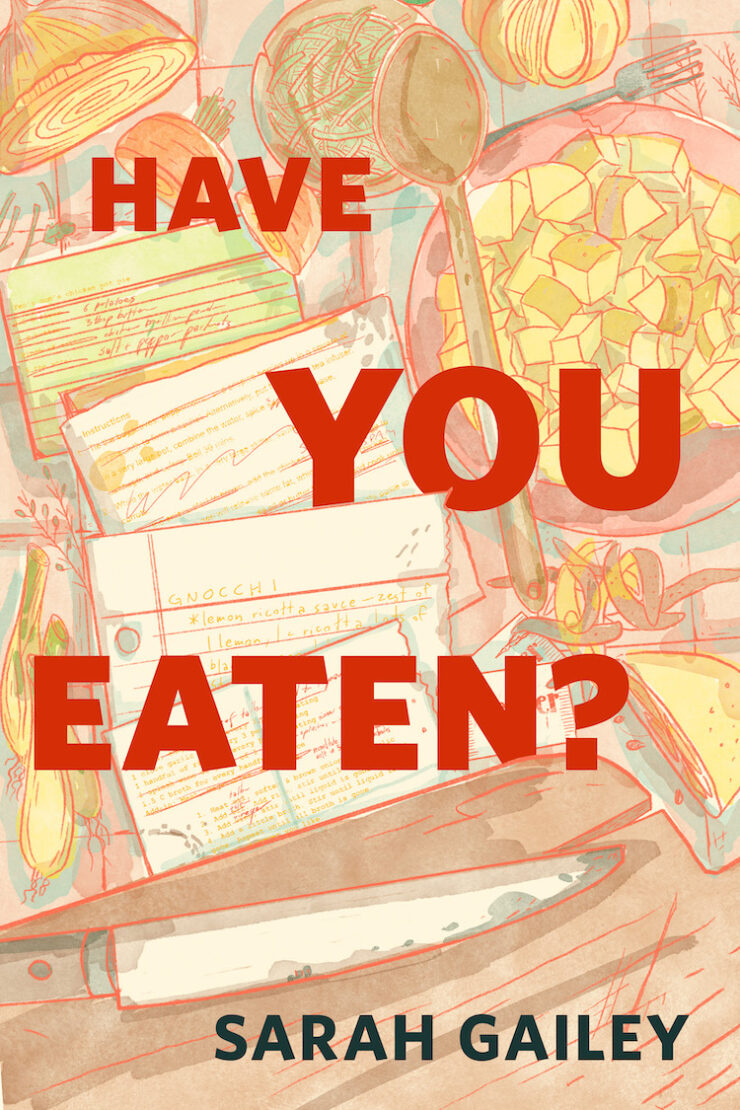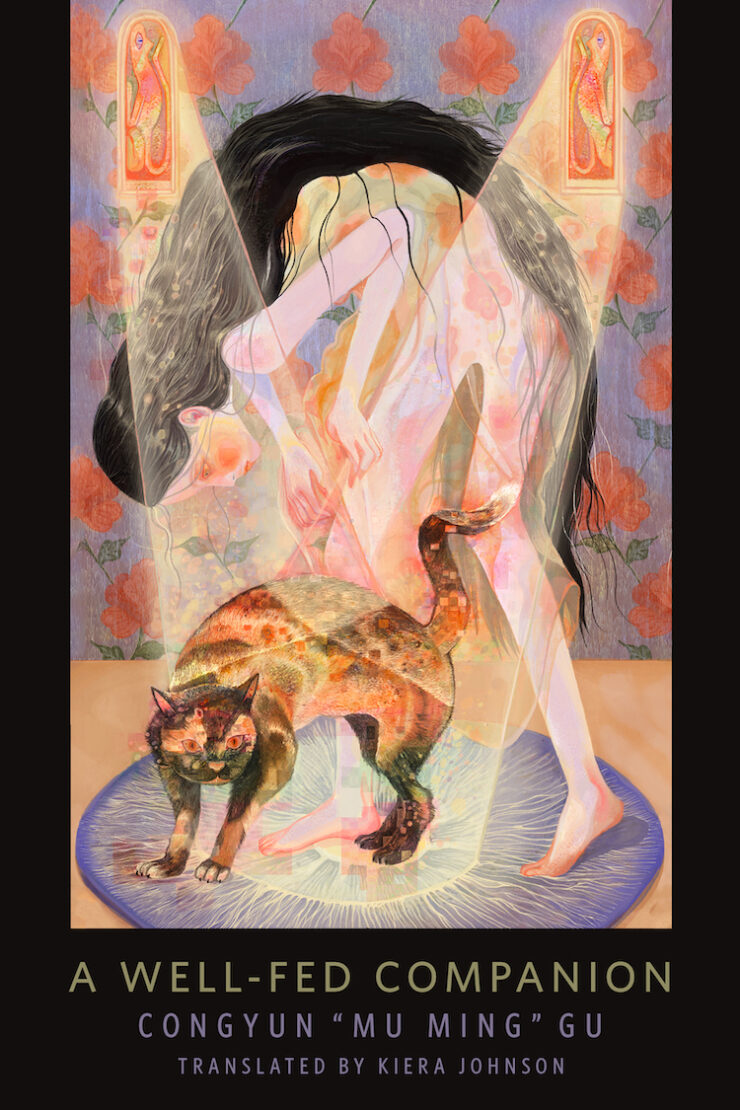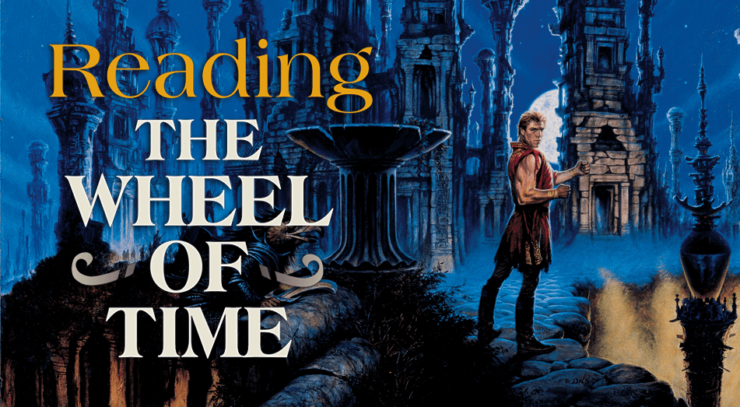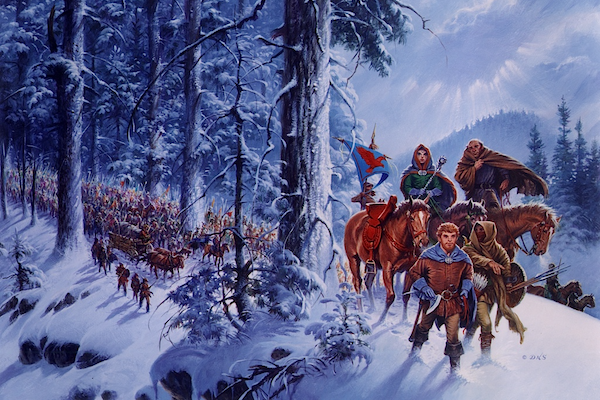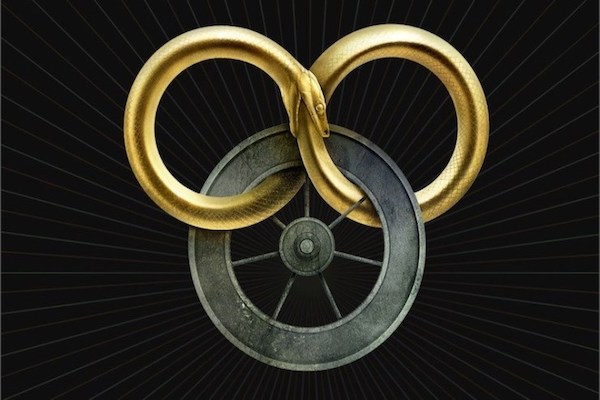Hello there, friends of Reading The Wheel of Time, and welcome to the first week of A Crown of Swords. I’m really excited to have made it to the the seventh book—that’s halfway through! It’s almost hard to believe.
Leading in from the end of Lord of Chaos, it really feels like the stakes have risen again for Rand and his friends. The fact that both members of Egwene’s and Elaida’s Aes Sedai have sworn allegiance to Rand after the battle at Dumai’s Wells really feels like it’s going to change a lot of the politics of the world—though of course I imagine neither Elaida not Egwene are going to just roll over and surrender authority to Rand because he forced the hands of a few dozen Aes Sedai using the threat of Taim and the Asha’man.
And actually, Elaida has had a foretelling about that. So lets get started with “Lightnings” the Prologue of A Crown of Swords. We’ll be covering Elaida, Sevanna, and Alviarin’s sections today, and we’ll get to the boys—Niall, Valda, and Gawyn—next week.
From a window high in the White Tower, Elaida observes the ongoing construction of the palace she has ordered to be built, a palace intended to rival the splendor of the White Tower itself. Then she turns to observe a clock depicting Aes Sedai defeating Trollocs and false dragons and being knelt to by a king and queen, which had once been commissioned by an Amyrlin who had dreamed “of a return to the days before the Trolloc Wars, when no ruler held a throne without the Tower’s approval.”
Elaida is pleased to recently have received a coded message from Galina that “The ring has been placed in the bull’s nose. I expect a pleasant journey to market.” She is delighted to know that within two weeks, Rand al’Thor will be in the Tower, supervised and guided by her until he is needed for Tarmon Gai’don.
Well, that troublesome young man would be wrapped in swaddling and kept safe as an infant in his mother’s arms until time to take him to Shayol Ghul. After that, if he survived….
Elaida’s lips pursed. The Prophecies of the Dragon seemed to say he would not, which undeniably would be for the best.
Alviarin comes in without even knocking, and Elaida thinks bitterly how much the Keeper seems to treat her as an equal rather than a superior. Elaida hates the reminder that she was weak when she came to the Amrylin Seat, and that she is still not as strong as she should be. Alviarin brings information—word that Nynaeve and Elayne have been sighted, passing themselves off as full sisters, in Ebou Dar, along with two others, reports about the strength of the Black Tower and Mazrim Taim’s presence, there, and news about the rebel Aes Sedai marching toward Tar Valon. Elaida is dismissive of all these reports, though Alviarin proves that Nynaeve and Elayne have actually been sighted by producing a sketch by the informant. Elaida angrily orders all four women to be brought to her, then begins issuing orders for Toveine to lead twenty sisters and two hundred of the Tower Guards to the Black Tower, to gentle and then hang any man they can channel along with as many others as they can take alive.
Alviarin doesn’t blink at this violation of Tower Law, but does suggest that Elaida send fewers sisters, given the threat of the Salidar Aes Sedai marching on the Tower. Elaida laughs herself silly at the information that they have chosen Egwene as their Amyrlin—she is certain that the frightened rebels hope to bluster and threaten and then offer up Egwene as their sacrificial lamb so that their own punishment will be lessened. Alviarin argues that three hundred Aes Sedai and an army led by Gareth Bryne should be taken seriously, but Elaida is quite confident in Tarna Feir’s report that most of the rebels are already on the point of breaking. She tells Alviarin that she means to break them all.
Suddenly the Foretelling took hold of her, a certainty about things she could not see stronger than if they had been laid out before her. She would have been willing to step blindly over a cliff on that certainty.
“The White Tower will be whole again, except for remnants cast out and scorned, whole and stronger than ever. Rand al’Thor will face the Amyrlin Seat and know her anger. The Black Tower will be rent in blood and fire, and sisters will walk its grounds. This I Foretell.”
Elaida is delighted to see that Alviarin’s cool demeanor has finally cracked. She looks shaken, and Elaida spins out her plans, thinking all the while about how certain her victory is and, despite the petty stumbling blocks of Alviarin’s disrespect and the Hall’s resistance to many of her decrees, she is entirely confident in her vision of the future. She thinks to herself that the Chronicles would remember her as the greatest Amyrlin of all time, the most powerful woman in the history of the world, and the woman who saved humankind.
Buy the Book
Origins of the The Wheel of Time
Standing on a ridge, Sevanna prepares the Aiel to attack the Aes Sedai wagons and capture Rand al’Thor. She has lied to the Wise Ones, saying that Desaine was murderd by the Aes Sedai, in order to secure their help in the attack on the Aes Sedai wagons. Despite her follower’s advice, Sevanna orders every single Shaido into the fray, leaving no scouts or reserves. As she marshals her forces, she thinks on her own ambition, and how the old ways of the Aiel will be abandoned as well, in favor of better.
Once Rand al’Thor was in her hands, once she had wed the Car’a’carn, the chief of chiefs of all the Aiel—this nonsense of the Dragon Reborn was wetlander foolishness—there would be a new way of naming clan chiefs, and sept chiefs as well. Perhaps even the heads of the warrior societies. Rand al’Thor would name them. Pointing where she told him, of course. And that would be only the beginning. The wetlander notion of handing down rank to your children, and their children, for instance.
Drunk on the idea of securing control over the world for herself and her descendants, Sevanna orders the attack. It goes well at first, with the Wise Ones countering the Aes Sedai’s attempt at erecting a protective shield and the channelers fighting with fire and lightning. The Aiel numbers work to their advantage, and although Sevanna is shocked when wolves and wetlanders on horseback enter the fray, she maintains her determination, even taking up a spear to defend herself. She kills a wolf, then receives a report that there are also Aiel and Maidens, as well as Wise Ones, attacking with the Wetlanders. The Wise Ones refused to fight other Wise Ones, so Sevanna bitterly directs them to keep fighting against those enemies they can bring themselves to face.
Since she cannot channel, Sevanna doesn’t know what to make of the way the feeling of the battle suddenly changes. A new shield is erected around the wagons, infuriating her, and she screams at the Wise Ones that they are supposed to be counteracting whatever the Aes Sedai do. Two of the Wise Ones, looking stricken and sick, tell her that it is not the Aes Sedai, not a woman, who is channeling.
Sevanna sees a banner lifted in the air above the wagons, but she continues to demand that the Aiel press harder until suddenly the earth near the shield begins to explode, again and again. The Shaido being to flee, and although Sevanna orders them to stand and even strikes out against her own with her spear, they ignore her. Finally she grabs hold of one of the fleeing Wise One’s arms, insisting that they can still have Rand.
The other woman’s face was a mask of fear. “If we stand, we die! Or else we end chained outside Rand al’Thor’s tent! Stay and die if you wish, Sevanna. I am no Stone Dog!” Ripping her arm free, she sped eastward.
Finally, Sevanna throws down her spear and runs with the rest. But instead of panicking, she is planning, and she slips her hand into her pouch to find the little stone cube. She still has tools to fight, and is still determined to have Rand al’Thor on his knees before her, and the Aes Sedai as well.
Alviarin makes her way down from Elaida’s chambers towards her own, barely registering the sisters she passes in the hall, thinking over her encounter with Elaida.
“A woman of many layers, Elaida. The first look at her showed a beautiful woman filled with dignified reserve, the second a woman of steel, stern as a bared blade. She overwhelmed where others persuaded, bludgeoned where others tried diplomacy or the Game of Houses. Anyone who knew her saw her intelligence, but only after a time did you realize that for all her brains, she saw what she wanted to see, would try to make true what she wanted to be true. Of the two indisputably frightening things about her, the lesser was that she so often succeeded. The greater was her Talent for Foretelling.
She considers that it might be necessary to kill Elaida, but is hesitant to do so without permission. In her own chambers she is visited by Mesaana, who appears as a figure of sivery light and dark shadows. Alviarin goes at once to her knees, and when bidden reports on every bit of her conversation with Elaida. She has learned that Mesaana is able to eavesdrop on these conversations anyway, and doesn’t know why Mesaana insists on the recitation.
She has been visited by many of the Forsaken, first Ishamael, who had elevated her to head of the Black Ajah, then others—Lanfear, Graendal, Be’lal. None of them had hidden their faces as Mesaana does, which has led Alviarin to the conclusion that Mesaana is in the White Tower, passing as one of the sisters.
When Alviarin suggests that Elaida’s Talent could be dangerous, Mesaana laughs it off, and suggests that Elaida still has her uses. She directs Alviarin to execute Elaida’s orders.
Finally, Alviarin dares to ask Mesaana if it is safe to send fifty sisters to deal with the Black Tower. She knows that it is dangerous to ask questions of the Chosen, and Mesaana doesn’t answer. Instead she remarks that Alviarin’s curiosity could be an asset, if properly directed, and leaves the threat of improper direction hanging in the air. She tells Alviarin that if she wants to serve Mesaana she cannot serve any of the other Forsaken, only her. And of course the Great Lord, but Mesaana over all but him.
Alviarin promises fervently to obey only Mesaana, and thinks to herself that she has just learned something astounding about the Chosen.
“You have a little strength, child. Not much, but enough.”
A weave appeared seemingly from nowhere.
“This,” Mesaana chimed, “is called a gateway.”
Well. Elaida isn’t Black Ajah, but her self importance and stubborn hubris really does remind me of some of Lews Therin’s enemies. It’s one thing to desire power, but it’s quite another to want to be, as she puts it, “the most powerful woman in the history of the world.” It’s an attitude that reminds one of most of the Forsaken, really, and I think it’s going to be her downfall even more surely than the fact that her Keeper is also the head of the Black Ajah.
Alviarin observes that Elaida is intelligent, yet sees only what she wants to see. I think that analysis is spot on. There are a lot of characters so far in the series who have been hampered by an inability to see how the world is changing, who insist on continuing to see what they are accustomed to seeing. Pedron Niall is (yes I know, but we’re not getting there until next week) one such example. Fear of losing power is certainly part of what motivates these world leaders to close their eyes and ears to truth, but it’s also just fear in general. The threat of what Rand is prophesied to do to the world, the terror of Tarmon Gai’don and the Dark One breaking free to touch the world—it’s understandably a lot for people to face. To continue with the example of Niall, the leader of the Whitecloaks has decided for himself that the prophesied Last Battle will be like the Trolloc Wars—horrible, but nothing as bad as what the prophecies say is coming. I think that it’s fair to judge that Niall, experienced and knowledgeable as he may be, just can’t wrap his head around the idea that he might actually have to come face to face the Forsaken and the Dark One in battle.
Sure, he also wants to be an important leader, and he has some pretty abhorrent ideas about who is good and what proper order looks like. But his desire to protect the world is always forefront in his mind, despite his other failings and prejudices. We’ll touch on this more next week.
With Elaida, it’s the other way around. Throughout this section, she thinks primarily of her own glory. She barely seems to be considering Tarmon Gai’don at all. She acknowledges the importance of uniting the world and preparing for the Last Battle—like Niall, she sees Rand’s actions as detrimental to that unity, rather than an attempt to cement it—and hopes that they still have many years to get ready. But her mind is already on what such preparations mean for her, personally. She’s busy dreaming of a White Tower restored to it’s pre-Trolloc wars level of power and influence. Busy building an absolutely ridiculous palace that she wants to surpass the White Tower in both splendor and height, despite the fact that she can’t get any Ogier masons to help build it. Busy imagining her legacy as the most important woman in history, the woman who saved all of mankind.
As though the survival of the human race will be down to one single person, and one who isn’t even in any of the prophecies on the subject.
I wonder if Elaida has been dreaming of this glory since the Foretelling that led her to attach herself to Morgase and Elayne. When we first learned about that Foretelling, several books ago, I assumed that she didn’t tell anyone about it for the same reasons Moraine and Siuan were forbidden from telling anyone about Gitara’s Foretelling—sure, Elaida’s vision was not as significant as as Gitara’s, but anything touching on the Last Battle was sensitive material even before anyone found out that the Black Ajah was real. Now, however, I have to wonder if Elaida’s main motivation was always a desire to be more important than anyone else, an attempt to grab power by situating herself close to something so vital to the future of the world. By telling no one of her vision, Elaida could ensure that any glory she obtained from this connection was hers alone.
Foretelling in general is a fascinating Talent. While Foretellings are always true, they are also hard to interpret. Mesaana notes that Elaida’s Foretellings are much plainer in speech than is usual, but that doesn’t mean that they are easy to interpret. For example, there is every likelihood that Elaida’s Foretelling regarding the throne of Andor was actually about Tigraine being the mother of the Dragon Reborn, and not about Elayne’s importance at all. And her Foretelling in this section is equally up to interpretation—Elaida is certain of her words, but once again could also applying that certainty in a way that favors what she wants to be true.
The Amyrlin and White Tower spoken of in the Foretelling might be Elaida and her followers, but it could equally mean Egwene and the rebels. And the fact that sisters will eventually walk the grounds of the Black Tower does not mean that they will be the ones to rend it in blood and fire—just because the two facts were uttered in succession doesn’t necessarily indicate causality.
Elaida has always been petty and selfish, and blamed others for her own situation. She always treated Siuan as though “the Sanche-woman” had usurped her position as Amyrlin. It was no fault of Siuan’s that Elaida chose to attach herself to the Andoran throne instead of staying in the Tower, after all, but Elaida makes Siuan symbolic of the fact that her ambition to be Amyrlin was thwarted by her ambition to be important to events leading up to the Last Battle. Still, there is something different about her in this section, something that feels dissonant with the POV we’ve had for her up until now. I’m almost wondering if her time with Ordeith-Fain hasn’t amped up all the petty, jealous, ostentatious, and suspicious aspects of her nature.
Yes, she has always had all those traits, but her narration has also always felt steady and strong. Here, however, it feels erratic, and her mood seems to rock back and forth between rage and elation, between self-doubt and self assurance, with very little apparent reason. For example, one moment she believes that Alviarin is deliberately controlling things to make her look like a fool, but in the next she thinks Alviarin can’t even see things an Accepted would be able to see. She views her as blocking Elaida’s path to full power as Amyrlin, then believes she is nothing more than a weasel that Elaida plans to skin.
You can see her irrationality in every aspect of this section. Apparently she made Teslyn resign as a Sitter in the Hall and sent her to Ebou Dar, not for any actual infraction but just to prove to everyone that even members of Elaida’s own Ajah aren’t immune to her judgements. But Elaida has been playing the game of politics long enough that she should know that all this is going to do is make enemies of everyone—if your supporters can’t trust you to treat them like supporters, they’ll stop supporting you. Yet Elaida seems to think that she can cow the entire Tower by herself, simply by issuing punishments.
It’s hard to say for certain, since as I’ve said, these characteristics were already part of Elaida’s character. There is some stark symbolism in the fact that she used the One Power to grow herself red roses, just as she once did in the Royal Palace of Andor—I remember how Elayne questioned the morality of using the Power to grow decorative plants when the people were unable to grow enough food to eat, and how Elaida dismissed it basically by saying “well we can’t help everyone, so it would be unfair to help anyone.” I can see that Elaida building herself an Amyrlin’s palace. But I could also see that Elaida be guided with at least a few ounces of common sense. Some of the little details—needing her Palace spire to be taller than the Tower, replacing the painting of Rand with the ostentatious clock depicting longed-for Aes Sedai power—seem off. The frenzy in her thoughts feels like too much.
We know that Mordeth’s power makes people suspicious, greedy, and cruel. We also know that it caused the people of Aridhol to withdraw from the rest of the world, much like Elaida has withdrawn to a room high above any levels used by the rest of the Aes Sedai. Ordeith-Fain wasn’t around Elaida for that long, but perhaps it was enough for him to leave some taint of his influence on her.
I’m very curious as to whether Alviarin’s alarm was only because of the threat that Elaida could have a Foretelling that outs her as Black Ajah, or if it’s the content of the Foretelling as well. Although she is taking the threat of the Salidar Aes Sedai and Gareth Bryne’s army much more seriously than Elaida does, I doubt she would consider that a reference to “the Amyrlin” could mean the one the rebels elected. And a Foretelling of a restored and strong White Tower isn’t ideal for Alviarin in any case, given that the main task of the Black Ajah has been to destabilize the unity of the Tower. That’s why Alviarin sided with Elaida in the first place.
I found it really interesting to know that Alviarin has had encounters with so many different Forsaken. It’s also interesting that Ishamael, specifically, picked her out for head of the Black Ajah. I’d love to know what it was about her that drew Ishamael’s attention—one assumes the other Forsaken had the same question, and that’s one of the reasons they checked in with her in person. I’m also curious as to how Mesaana expects Alviarin to refuse to obey any of the other Forsaken but her—she must realize how easy it would be for any of her compatriots to compel Alviarin’s obedience. Though I can’t imagine her being very broken up if one of them killed Alviarin over a refusal to follow orders or a suspected double-cross.
Alviarin believes that Mesaana appears as a shadowy figure because she is actually in the White Tower, passing as one of the sisters. This is certainly possible, but because we know about inverted weaves and the ability to make disguises, it would not be strictly necessary for Mesaana to appear this way. Indeed, it’s likely that she would already have disguised her appearance if she was presenting herself as an Aes Sedai—she would probably have interrogated and then killed one of them and taken over her identity. If so, she could just as easily present her true visage to Alviarin, or make any number of other disguises.
So I imagine her choice of presentation has a more complex motivation. Part of it may be to intimidate or impress Alviarin, or to set herself apart from the other Forsaken who have visited the head of the Black Ajah in the past. The fact that she hears all of Alviarin’s conversations with Elaida also doesn’t necessarily mean she’s always around, either. Though we don’t currently know of any way of using the One Power to eavesdrop over long distances, there well could be, especially for one of the Forsaken.
However, I am forever and always suspicious of any brown sister who is described as being too distracted and dreamy to notice what’s going on around her. We’ve seen Verin use that trick too many times. Also, Danelle was able to assist in Elaida’s coup precisely because Siuan dismissed the fact that Danelle allowed far too many men to be hired to do the masonry repairs. This ended up being part of the forces Elaida was bringing in—we know now that Danelle must have allowed it on purpose, not out of absent-mindedness, as part of the plot. And yet, Alviarin, who knows Danelle’s role in the coup, dismisses her in exactly the same way. This feels highly suspect to me, and possibly a clue from Jordan.
I assume the thing that Alviarin just learned about the Forsaken is that they do not trust each other or work together, which could be useful information for someone like her—no doubt all the members of the Black Ajah hope to become new members of the Chosen, and perhaps even to supplant some of them. Knowing that there is division in their ranks might make her consider how to play them against each other. Liandrin thought to do something like that, if memory serves.
And now the head of the Black Ajah knows how to make a gateway. That really ups the mischief she can get up to, doesn’t it?
I still haven’t figured out the purpose of the little stone cube that Sevanna has. I went back and looked at where it’s mentioned in the prologue of Lord of Chaos, but all we know is that it was given to her by a wetlander who “told her what to do with it, with the aid of a Wise One who could channel, once al’Thor was in her hands.” Obviously it was one of the Forsaken, but that doesn’t give us much of a clue as to what the item actually does. Later in Chapter 53, Sevanna decides not to use the cube, and considers throwing it away, which makes me think that using the cube would kill Rand somehow, or maybe put him into the hands of whoever gave her the cube. It’s clearly a ter’angreal of some kind, so maybe it sends a message or opens a gateway, or just kills the object of your focus. That last guess would be a bit odd of a purpose for a ter’angreal, but the Age of Legends did end with a terrible war, so the existence of some kind of weapon like that is certainly possible. In any case, Sevanna decided not to use the cube once she knew she wanted to keep Rand for herself. It does require a channeler to activate it, which seems to be the case with the majority of ter’angreal we’ve encountered, but not all of them.
It was really interesting to see Dumai’s Wells from Sevanna’s point of view, since we already knew how the whole thing went down/was going to go down. It has struck me a few times during the read that the narrative has dispelled the stereotype of the Aiel as savage, blood-thirsty monsters for every clan except the Shaido. We don’t spend much time in the POV of any of the Shaido, and we hear a lot from other Aiel about how the Shaido are sneaky, thieving, and generally considered to be without the honor that the rest of the Aiel prize. We’ve seen their leaders be petty, power-hungry and weak-willed. We’ve seen Sevanna usurp positions that don’t really belong to her, or at least that she has questionable claim to. And we’ve seen the Shaido Aiel do exactly what the wetlanders believe all Aiel do—rampage and slaughter purely for material gain.
Sevanna herself rivals the possibly-Mordeth-addled-Elaida in her desire to be the most important woman in the world, but we do get little glimpses here of other Shaido Aiel, including Wise Ones, which at least begins to paint a slightly more 3D picture of who these people actually are. I was especially struck by Sevanna’s manipulation of the Shaido Wise Ones. Last week I was caught up in everything else that was happening, I didn’t really think about the fact that the Wise Ones never engage in battle. Rand’s followers were obviously willing to do whatever necessary to rescue him, so it made perfect sense to me that those Wise Ones would deem it necessary to use the One Power in battle against his Aes Sedai captors, even though this violated tradition.
The Shaido Wise Ones, however, had no such motivation. Without context, therefore, it was easy to assume that they were just as willing to corrupt or disregard Aiel law and tradition as Sevanna was, and for just as shallow a reason. But as it turns out, the truth is more complicated than that. True, Sevanna’s loyal Wise Ones were willing to break some very important rules, up to and including the murder of Desaine. But she used that murder as a spur against the other Wise Ones who might otherwise have resisted engaging in the fighting, who otherwise might have wanted to avoid further entanglements with the Aes Sedai. Making them think it was that the Aes Sedai who killed Desaine was a clever move. The Wise Ones were probably already on edge, with the knowledge they have about the history between the Aiel and Aes Sedai, and fearing Aes Sedai reprisal against them. Since they do not historically engage in battle, they’re also unaccustomed to losing one of their own in such a way, so the loss, and the brutality of it, would hit them especially hard, and be more likely to drive a purely emotional response.
Still, I wish we could have more Shaido characters. I believe it’s been stated that some Shaido did leave and join their societies in other clans, just as some Aiel affected by the bleakness have joined the Shaido, so there’s always room for the narrative to explore what it’s like for those characters to make their way among Rand’s followers. Much in the way that the Seanchan feel less like faceless villains now that we’ve met people like Cerandin and Egeanin, we need more characters from the Shaido who will humanize them for us in a way that Sevanna cannot.
I will admit that, for all I despise her character, her strength and bravery in facing the battle did impress me. Her bullying her way into being accepted as a Wise One did not, and it’s a wonder to me that so many Wise Ones accepted it, even if reluctantly. I wish we had a better sense of why they allowed it—it’s hard to imagine any of the Wise Ones we know allowing someone to just decide one day that she is a Wise One now, without going to Rhuidean or having an apprenticeship or giving up her other titles.
Next week we’ll finish the prologue, and possibly segue into Chapter One, depending on how much I end up having to say about Pedron Niall. I have to say, that section really surprised me. But for now, I’ll leave you all with the following observation.
Mesaana, when talking about Elaida’s schemes, observes that the modern Aes Sedai “almost match the ajah at times.” It’s not surprising that the term Ajah comes from an older word that was used differently in the Age of Legends, but this is the first we’ve heard about it. No real indication of what the ajah, was, but it’s interesting to note that it’s not a capitalized word.
Sylas K Barrett is also currently doing the Reviews for The Rings of Power here on Tor.com. Check them out if you haven’t already!



